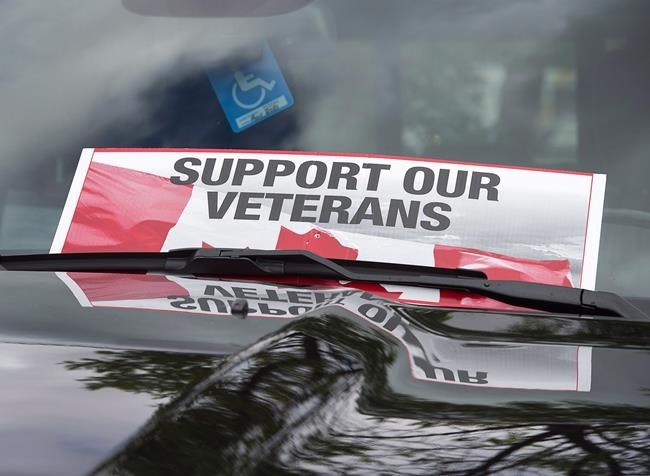OTTAWA — One of Canada's largest veterans' organizations is urging the federal government to automatically approve the roughly 44,000 outstanding applications for disability benefits from injured veterans to help them better deal with the COVID-19 crisis.
The call from the National Council of Veteran Associations, which represents more than 60 veteran groups, comes amid fears about the financial and emotional toll the pandemic is taking on veterans struggling with mental and physical wounds.
Veterans Affairs Canada says staff are still processing claims as they work from home and that there are no immediate plans to automatically approve the backlog, which was already a source of frustration and anger for many veterans forced to wait years for support even before COVID-19.
But the COVID-19 crisis presents yet another barrier for veterans to get their applications approved, said council chairman Brian Forbes, who is also executive director of The War Amps Canada and a member of Veterans Affairs Minister Lawrence MacAulay's policy advisory group.
"It was bad enough as far as the backlog and the delays and the number of new claims (before COVID-19)," Forbes said in an interview "And then when you put the coronavirus on top of it, you've got a perfect storm. Things are just not getting done."
One of the issues facing some veterans is that they require a doctor's assessment of their medical condition before their applications will be processed by Veterans Affairs. Yet many doctors are not seeing patients in person except in extreme circumstances, Forbes said.
Veterans Affairs recently reported more than 18,000 of the 44,000 applications in the backlog were "incomplete."
The federal government has long faced pressure to automatically approve applications for disability benefits for veterans, with Veterans Affairs going back after the fact to conduct audits and verify eligibility.
Not only are approval rates for most categories of injuries — including post-traumatic stress disorder — extremely high, advocates warn delays add undue stress on veterans while potentially exacerbating difficult financial and medical conditions.
Yet Forbes suggests it doesn't make sense for veterans to keep waiting months when the government is promising tens of billions of dollars in support to Canadians and companies to help with COVID-19 — much of which is expected to be disbursed quickly and verified later.
Veterans Affairs says the past week or so has seen more employees whose job is to process the disability claims continuing their work from home to ensure veterans are receiving decisions, especially those with the most urgent needs.
"Although we are not currently using automatic approvals with audits, we are encouraging decision makers to work more efficiently, using available evidence to reach the fastest decision possible," Veterans Affairs spokesman Josh Bueckert said in an email.
The call for automatic approvals comes as some veterans' organizations are expressing concerns about the impact that the COVID-19 crisis is having on the mental and physical health of Canada's wounded warriors.
Veterans Affairs says it has been checking up with former military personnel deemed "at risk" while some organizations are using telephones and video conferences to continue providing therapy, counselling and other support.
Yet many veterans suffering from physical injuries are now unable to get physio or rehab because of COVID-19 while the pandemic undermines one of the key messages broadcast to vets suffering from PTSD and other mental injuries in recent years: Don't isolate yourself.
"We have been talking for many years about getting our veterans out," said Royal Canadian Legion dominion president Tom Irvine, whose branches are helping former service members get groceries, access financial services and stay connected.
"It is a concern. There are going to be veterans or members of the Legion that are going to slip through the cracks. Hopefully it's minimal, but it is a concern. And that is why we're reaching out on a daily basis."
Irvine also voiced his support for the government to just sign off on the backlogged applications for help.
VETS Canada president Jim Lowther, whose charity provides emergency financial assistance and other services to homeless veterans or those at risk of losing their homes, says the organization has had more calls for help in the past two weeks than usual.
A former Canadian Forces member who was previously diagnosed with PTSD, Lowther says many veterans are worried about keeping roofs over their heads while for those suffering from mental injuries, "this is a dangerous time right now and hopefully it won't last too long."
Scott Maxwell, executive director of Wounded Warriors Canada, says his non-profit has also received more calls for mental-health assistance, which he took as a hopeful sign veterans suffering from mental injuries aren't retreating and instead are reaching out for help.
And while he says person-to-person contact is the "secret sauce" to his organization's successful therapy services, he was hopeful its forced shift to online and telephone assistance could eventually see it better supporting veterans in more remote communities.
This report by The Canadian Press was first published April 2, 2020.
Lee Berthiaume, The Canadian Press
